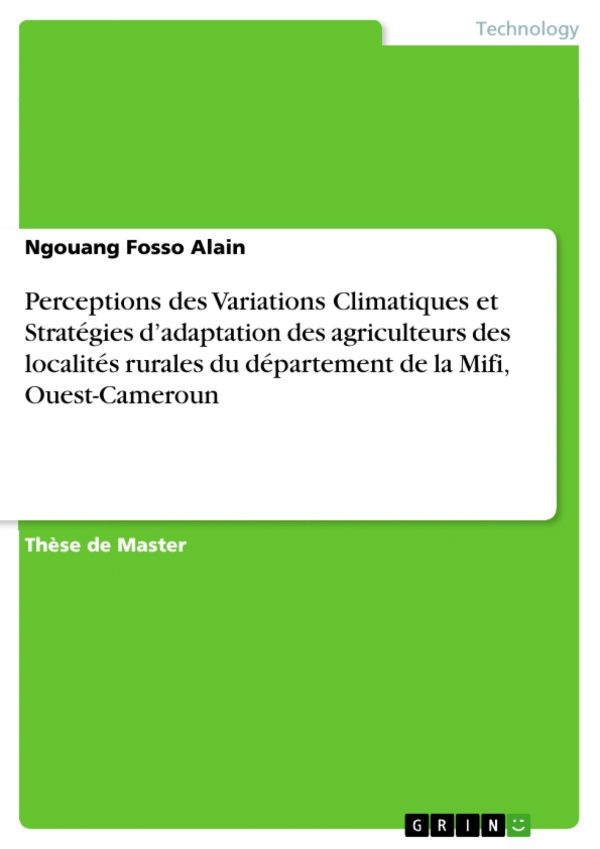
Research Project: “Climate Variations Perceptions and Adaptation Strategies of Farmers in Rural Localities of the Mifi Department, West Cameroon”
This research project focuses on the agrarian practices of small-scale producers in Cameroon's Mifi region in order to strengthen their capacity to adapt to climate change.


Overview of the project
Climate change is a major environmental problem for the African continent, particularly in predominantly agricultural regions, leading to profound changes in the framework and life system of agricultural producers in the rural localities in West Cameroon’s Mifi region. This study presents empirical evidence that demonstrates the local knowledge, perception and adaptation to climate change of smallholder farmers in the region.
Data was collected using qualitative and quantitative methods in the three districts of our study area, primarily the Mifi region. The criterion used for respondent selection was their activity, i.e. agriculture in rural areas. We therefore worked with farmers, public figures, heads of agricultural sectors, MINADER support staff, and staff from the various projects and programmes present in the field.
For the quantitative data, eight interviews with these different agricultural actors were held and a total of 100 questionnaires were distributed as follows: 40 questionnaires in the rural localities of Bafoussam (Nefo; Ndienso), 30 questionnaires in the rural localities of Baleng and surroundings (Tchada, Lag’ngwen) and 30 questionnaires in the rural localities of Bamegoum (Wouong, Nkongso). The qualitative data included eight transcripts of focus group discussions and key informant interviews. CSPRO software was used to process the questionnaires and joint-use of EXCEL and SPSS software programmes for data analysis and processing. Combining the different parameters, resulted in cross-tabulations, diagrams and histograms that developed our analysis and discussion.
Smallholders’ perceptions of climate change are increasingly changing: 40% of local farmers perceived decreasing and increasingly irregular rainfall, 26% perceived decreasing productivity, 16% too much sunshine and 14% noted insect infestation, crop rots and soil moisture. Smallholders are using a combination of adaptation strategies to respond to this changing climate phenomenon.
Strategies are both individual and collective; individual strategies include agricultural calendar modifications, use of enhanced seeds, expansion of cultivated areas, and off-farm activities such as trading, handicrafts and small livestock breeding. Significant relationships exist between perceptions of irregular rainfall and changes in sowing dates. Collective strategies are tontines and organisation into cooperatives/commune initiative groups (CIG).
The employed adaptation strategies, which remain essentially reactive and unplanned, are limited by material, financial and technical constraints, as well as access to information. Knowledge of climate perceptions and adaptations is a key entry point for other agricultural actors and policy makers to identify how and where to build the adaptive capacity of smallholder farmers to cope with climate variability.
Analyse the agrarian practices of small producers in the Mifi department through their perceptions of climatic variations and their adaptation strategies.
Ongoing research
More than 75% of farmers are now informed about climate change adaptation strategies.
Farmers are no longer adapting their agricultural practices to climate change in a haphazard way.
Association's membership fees
organisation

The organisation works for the promotion of development in West Cameroon.



